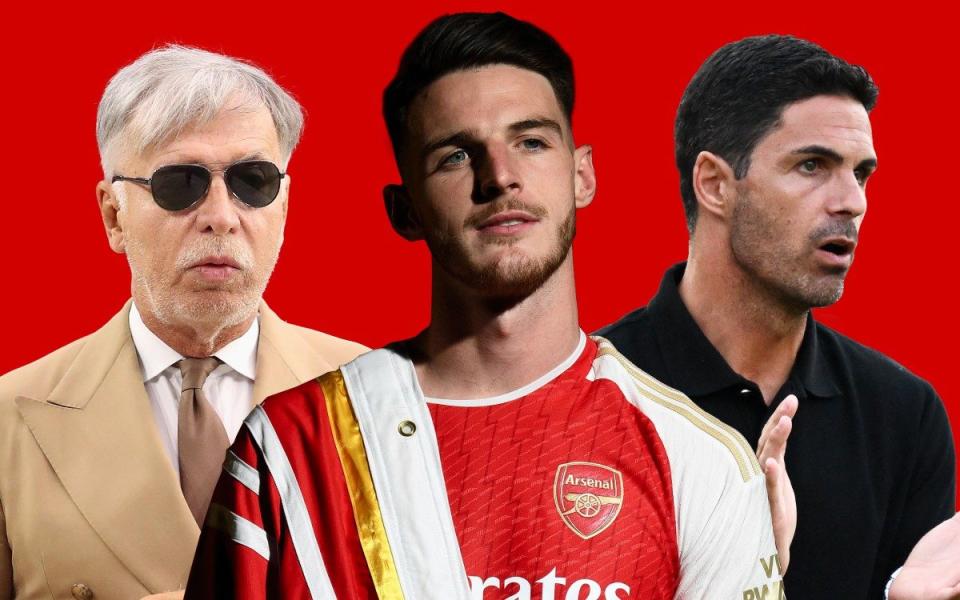
Shockwaves continue to reverberate through English football after Arsenal outbid Manchester City to make Declan Rice their first £100 million player but, for those watching closely, should there really have been much surprise?
It is almost 17 years since an American billionaire called Stan Kroenke jumped into a London cab with the corporate lawyer Tim Lewis to meet representatives of ITV and spend £42.3 million on a 9.99 per cent stake in Arsenal.
Each subsequent move – and occasional bluff – has since combined dead-eyed patience with sometimes urgent decision-making in pursuit of two unerring aims.
The first was to add Arsenal to a $15 billion sports empire that is now comfortably the biggest and most lucrative in the world. The second was to develop a club that would regularly compete for football’s greatest prizes.
Various narratives have taken hold at different times but, in breaking the British transfer record and moving so decisively to capitalise on last season’s progress, the Kroenke family clearly feel pretty good just now about the prospect of adding to a golden streak of on-field success.
The Los Angeles Rams, the Colorado Avalanche and the Colorado Mammoth respectively won the NFL’s Super Bowl, ice-hockey’s Stanley Cup and lacrosse’s Champions Cup last year while the Denver Nuggets have just become the NBA basketball champions for the first time in their history.
As for Arsenal, with four FA Cups but best Premier League finishes of second in 2016 and again this year, the theory gathers credence that the Kroenke era is actually best understood in two distinct phases.
There was the period to August 2018, which also coincided with Arsène Wenger’s final decade at the club, when the Uzbek-Russian oligarch Alisher Usmanov raised his competing stake to 30 per cent and was desperate to buy Kroenke out. It is argued that if Kroenke had then ploughed money into refinancing major historic debts, and dramatically increased transfer spending, both of which he has since done, one big indirect consequence would have been to ultimately further enrich Usmanov.
The second phase, then, is these past five years that began when Usmanov finally conceded defeat and sold his shares to Kroenke for £550 million. “My family really took ownership of the club in 2018,” Stan’s son Josh says, despite their majority stake since 2011.
“I think he [Stan] was in a different frame of mind having taken 100 per cent control,” agrees Lewis, whose role also evolved from that of Kroenke’s legal counsel between 2007 and 2020 to now the club’s executive vice-chairman and a pivotal hand-on influence as the owner’s trusted London aid.
Decisions over Arsenal’s three formal bids for Rice, for example, were ultimately only signed off last month by Kroenke after Lewis had taken the recommendation following discussions with senior football staff, notably manager Mikel Arteta and sporting director Edu.
“My role is not to give football advice but to be there to support and challenge,” Lewis says. “They need to be able to explain in order for me to understand and communicate for Stan and Josh to back the recommendation. The brain has to be lined up. Stan and Josh want great information. Then they can decide. Trust is a short word. If you’re a multi-billionaire, it’s a big word.”
Lewis has never previously given a media interview and, while very mindful of the challenges that have been faced and the constantly precarious nature of football, says that he “would really like people to understand what fantastic ownership we have”.
So what might that mean in practice?
Consistency has perhaps been the central hallmark, both in outlook and the staff around them. The Kroenkes have never sold shares in their sports teams since first buying a stake in what were the St Louis Rams almost 30 years ago. The overriding mantra is long-term decision-making that is not much buffeted by the often febrile outside noise.
It all means that they can appear passive or distant if they think that it is best not to respond to some event or other, but they are also strikingly bold at other moments. Moving so emphatically in the transfer market at this moment of strength feels like one such calculation.
“A few people mistake Stan’s calm nature for not being engaged – he’s willing to ask tough questions but knows when to stay in the background,” Kevin Demoff, then the chief operating officer of the St Louis Rams, told me during a visit to the United States to interview Kroenke in 2011.
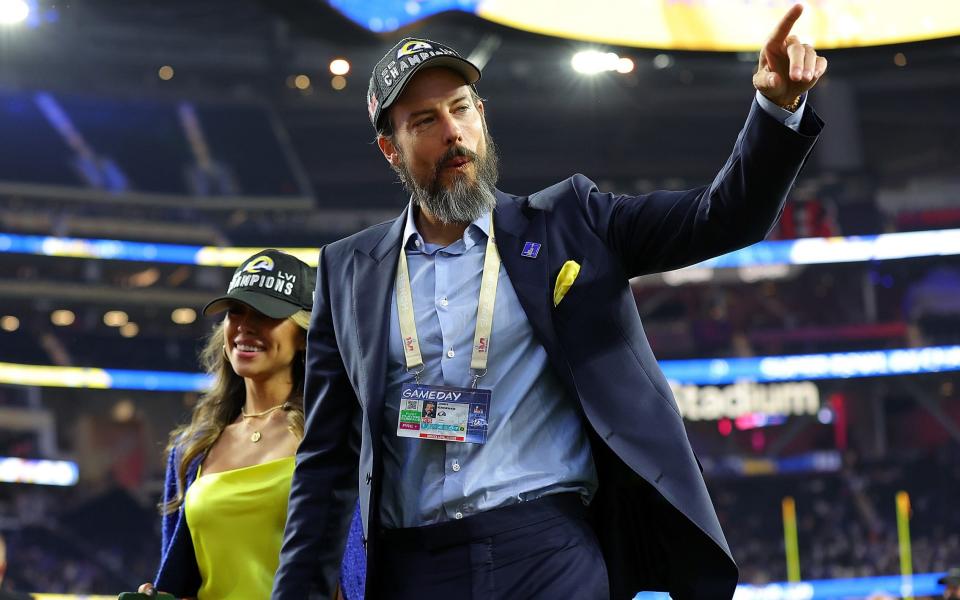
Twelve years on and Demoff’s description of his boss has barely changed, although he is now president of what has become the Los Angeles Rams and based some 2,000 miles from St Louis at the Kroenke’s new $5 billion SoFi Stadium in California. That move was itself hugely controversial but it is a venue that has already staged the Super Bowl and, as well as Arsenal’s pre-season friendly with Barcelona next Thursday, will host World Cup matches in 2026 and the opening and closing ceremonies at the 2028 Olympic Games.
“Having the patience and fortitude to go through the ups and downs for a strategy that you believe in is paramount,” Demoff told me this week.
Other memories of that 2011 trip include seeing Kroenke rather dispel the ‘Silent Stan’ caricature while watching the Rams from his private box and the then 31-year-old Josh prophetically outline his excitement at maybe getting involved at Arsenal. Now the co-chair, Josh has been a noticeable presence this week with Arteta and the players during Arsenal’s pre-season US tour and is in near constant touch with key figures at the club.
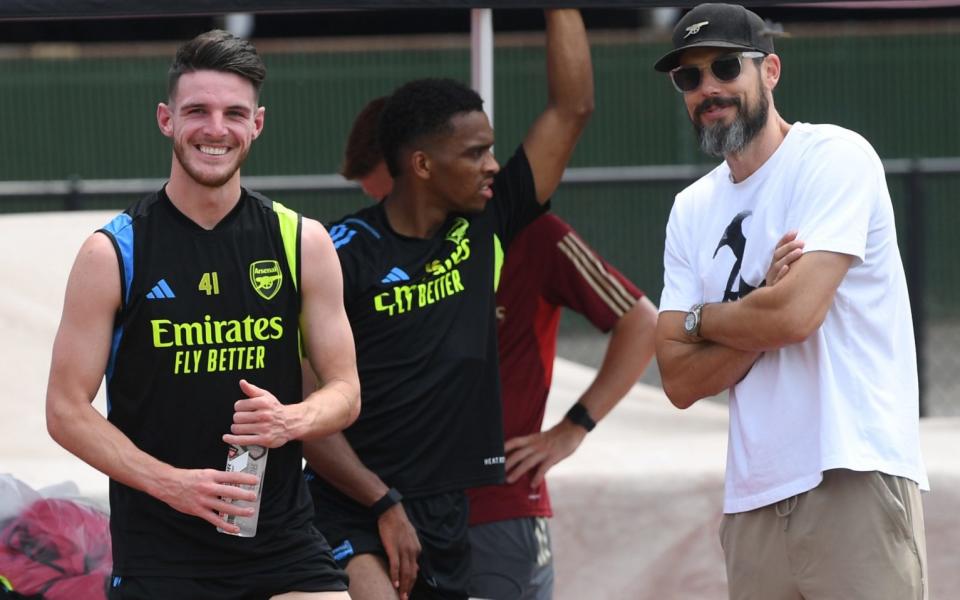
Lewis, like Demoff, has seen most sides of Kroenke Snr, initially as an advisor through the 11-year takeover battle with Usmanov that became one of the longest poker matches in history.
Rather than also buy David Dein’s shareholding back in 2007, which would have antagonised the Arsenal directors, Kroenke instead forged internal relationships, accepting a place on the board in 2008 before then becoming the choice of Danny Fiszman, Lady Bracewell-Smith and Peter Hill-Wood for their family shares three years later.
“A lot of things in public takeover work require pace, efficiency, speed,” Lewis observes. “But Stan really taught me the value sometimes just to watch. In the right circumstances it can be very powerful. He has incredible patience. He has a phenomenal memory and a clear idea about what he should be focused on.”
If the takeover battle with Usmanov required staying power, urgent action was needed in the summer of 2020 when the Covid pandemic had shut down the world.
“Cheque. Bullet. £236 million … quite a big sum of money,” Lewis says, revealing the speed not just with which Kroenke dealt with the problem but the severity of the threat that Arsenal faced.
Football clubs had stopped staging matches in front of fans and Arsenal were still paying back the 25-year loan they took out in 2006 to build the club’s Emirates home.
“The covenants in the bond got tested at specific moments,” Lewis says. “If you breached them badly enough, the bond holders took control of the club. Because of the pandemic, the club was likely going to breach them that badly.
“In the normal world you see these things coming but we weren’t in a normal world. We had to pay it off and we had very limited time in a period where there was so much uncertainty to so many people. Stan understood what needed to be done – and he was prepared and capable of doing it.”
Covid was also the catalyst for a deeply unpopular redundancy programme. Arsenal then fell out of Europe for the first time in almost 30 years in 2021 but wider change was afoot. Vinai Venkatesham had become chief executive. Head of football Raul Sanllehi left within weeks of Lewis taking an active internal role. A series of transfer rules and parameters were established, notably around the age profile of new signings, which has evolved again this summer in buying still young but already established internationals such as Rice, Kai Havertz and Jurrien Timber. Having got back to the top table of English football, Arsenal are thinking hard about how to stay there.
“Of course we were all pretty disappointed last season, even if logically we were not that surprised,” Lewis says. “We knew where we were depth-wise. It was still fantastic. The trick now is to have a good enough summer to do better. We are going to be in the Champions League. We need a bit of that experience in the team. We need more depth. But you also can’t do too much. We have a squad and team with a balance, a life and culture. You want to improve and not endanger it.”
Talk of culture also regularly now extends beyond the first team and, with even Arteta noting that “the soul of the club had been lost” before his appointment in 2019, a deep dive review was commissioned that culminated in redefined values and purpose. The emphasis is on living them daily, but they have been summarised in a single page and the present-day version of the old ‘victory through harmony’ club motto is ‘acting for a winning team, culture and community’.
Crucially, Arsenal opened up to the outside world and, with the league’s youngest squad and a manager in Arteta with the personality to connect, an identifiable narrative and outward confidence snowballed. The match-day fan base is re-energised and generally also younger following changes to ticketing, notably the ‘use it or lose it’ rule, which means that season-ticket holders can no longer buy seats for men’s games and then regularly leave them empty. Other more subtle things have been done, such as increased engagement with club legends and the local community.
“Fundamentally it was about being brave enough to communicate,” says Lewis, who stresses that he is as likely to talk with the Kroenkes about some sort of cultural decision as those that require a big cheque.
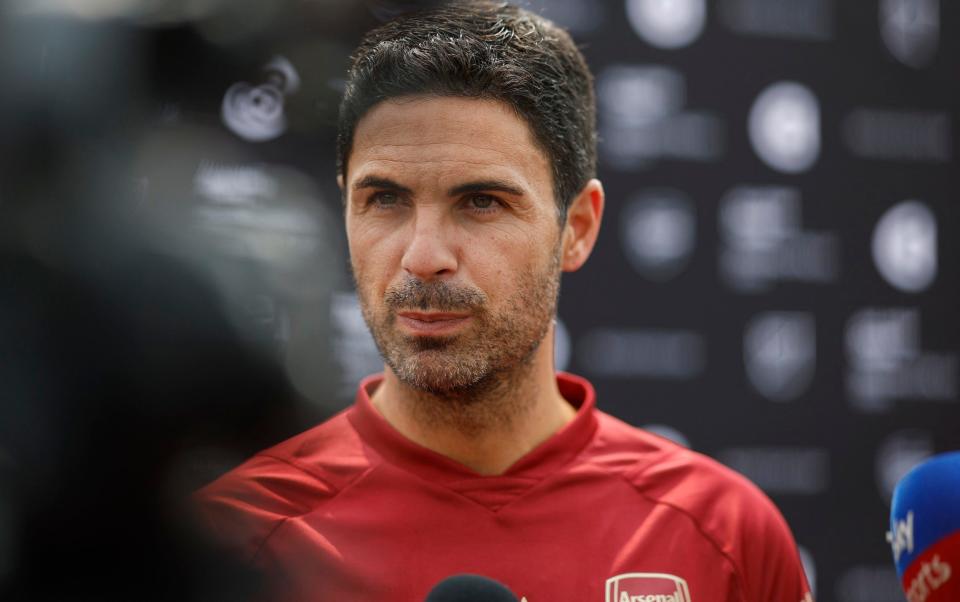
Physical changes include the transformation of the London Colney training ground and the stadium artwork where the club’s history, and notably the achievements under Wenger, scream out from the walls. Kroenke actually made a point of flying in from the United States for Arsenal’s Boxing Day fixture against West Ham last year so that he could personally see Wenger on his first visit to the Emirates since 2018.
“It was great to take Arsène down to the dressing room,” Lewis says. “Bukayo [Saka] didn’t know him but he called him ‘boss’ immediately. He was, ‘Boss, how can I improve?’ Arsene very dryly said, ‘I think you could use your right foot a bit more’.”
With the 20th anniversary of the Invincible season looming, Arsenal are ready to unveil a statue to their former manager. “We live Arsène’s legacy every day,” Lewis says. “He coped with this period when you didn’t have a single owner able to back, and control, and invest. He kept the club as far up the table as he possibly could. What he achieved was remarkable.”
Arteta was one of Wenger’s best later captains but hardly a low-risk managerial appointment and there are parallels inside the Kroenke organisation with Sean McVay, the 37-year-old LA Rams head coach. McVay has already reached the Super Bowl twice since his appointment in 2017. Arteta visited McVay in Los Angeles during the World Cup break last season while McVay spent time at Arsenal’s Colney training base after the NFL season had finished this year. The Arsenal squad will also train at the LA Rams’ California training facility next week as part of their pre-season tour. “Sean and Mikel have built a great relationship – and they carry very similar pedigrees,” says Demoff, the Rams president.
“These teams don’t operate in a vacuum. There’s this support network and common thread: a team built around a talented head coach, many of whom haven’t had opportunities before. Then the patient methodical build to get to a point where the teams are ready to push for a championship. Then a dogged pursuit of how you get better from there.
“Stan and Josh are really skilled at identifying great leaders. Sometimes they might not be obvious at the time, but they have a vision of what these people can become.”
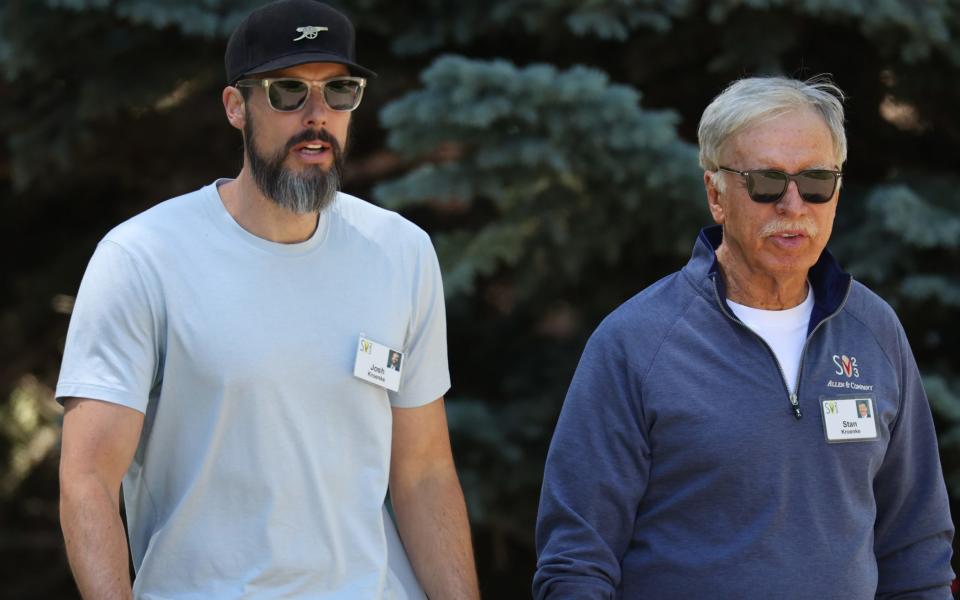
Indeed, it is easy to forget the debate even last year over Arteta’s contract renewal after Arsenal had lost three straight games and were poised to again miss out on the Champions League.
“We didn’t think he was on a contract that reflected his contribution, or where he was in the market place, and we wanted to get ahead of the curve,” Lewis explains.
“We also knew we had a seriously talented guy on our hands. I think we all see it .” And what is ‘it’? “Hmmm … genius? Maybe. Incredibly passionate, clever, committed and inventive. It’s a relationship. It’s important to know that people around you are supportive. Mikel wants to win. And he wants to win here.”
Those sentiments, and the impact of the Kroenkes’ faith at a moment when some owners would have wavered, certainly felt relevant last month when Arteta was asked about Paris St-Germain’s interest. “I’m happy at Arsenal,” he said. “I feel loved and also appreciated. I’ve got a lot of things to do for this club.”
With more than £200 million already spent this summer on new players, a sense of momentum has been maintained even after their stumble in the finale to a gripping Premier League title race.
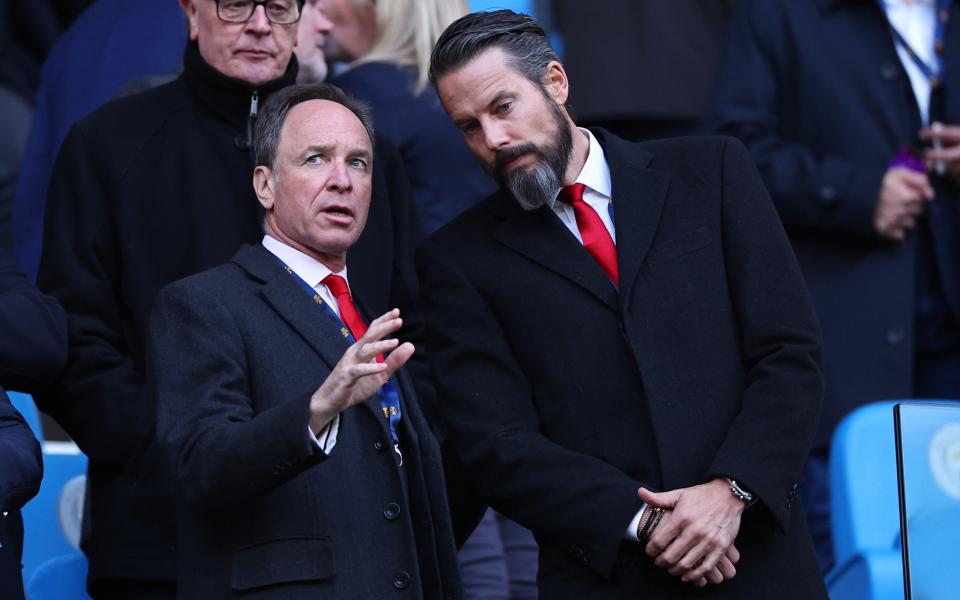
The contrast with Josh Kroenke’s appearance in the Amazon documentary series following the botched European Super League proposal two years ago feels huge. “We had upset a lot of people and it stinks,” he admitted. “I understand that we have a long way to go to build back the trust with our fan base.”
Clive Palmer, the host of the Arsenal Vision podcast, says that it proved to be a line in the sand. “They came with a blank piece of paper and properly engaged and listened,” he says. “I cannot believe the change in the whole atmosphere. I look at the overall alignment, with how people are supported and the oversight there is, and I see no gaps.”
One of the vocally critical voices was the Arsenal Supporters’ Trust, a group that held shares until the full takeover in 2018 and had always pushed for plural ownership. It is now represented on the club’s new ‘advisory board’ that was established in November 2021.
“You can’t be an Arsenal fan at the moment and not be happy and excited,” Akhil Vyas, an AST board member, says. “We’re competing. We’re back in Europe. We have broken the British transfer record. You’ve got to give them credit but I think people will always still be watchful over things like debt and the Super League. Our role is to keep an eye on the wider picture.”
Others argue that the ‘Kroenke Out’ campaign was always misguided and point to the likely mess if Usmanov, who was subjected to sanctions following Russia’s invasion of Ukraine last year, had prevailed in the takeover battle.
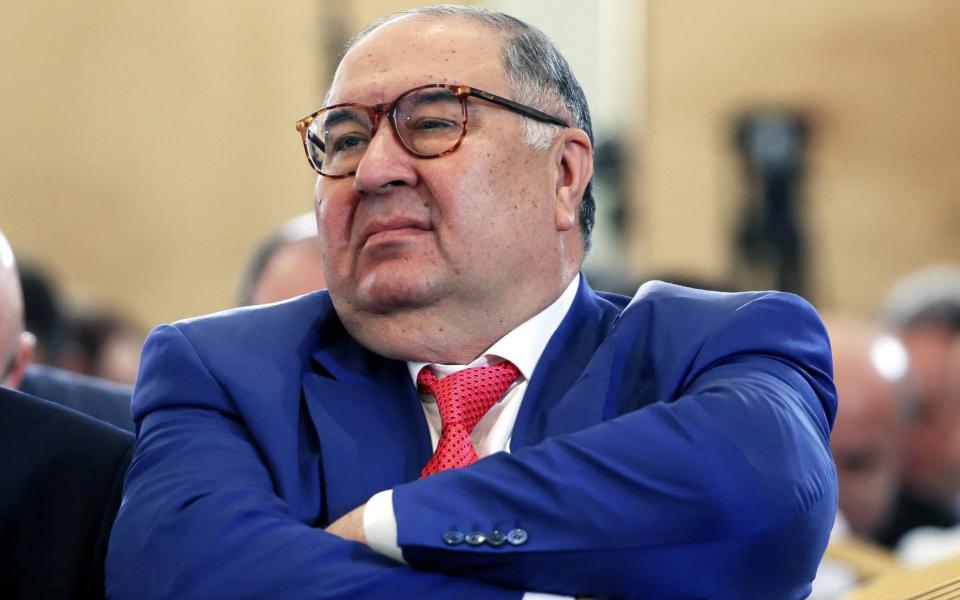
Palmer believes that a certain tone was set as far back as Kroenke’s first share-buying in 2007 when Hill-Wood, the chairman from 1982 until 2013, so memorably said that “we don’t want his sort” at the club. Hill-Wood, it should be noted, was among the first to change his mind. “Sometimes it’s how you walk through the door,” Palmer says. “Straight away it was, ‘Who are these pesky foreigners trying to get near our club?’ Then we went into the dual ownership era. The club was defined by division. He was waiting for the other to disappear. The squad was bloated and overpaid; now it has the youngest average age. Every player is contracted and we have got this four or five-year window ahead. It’s a genius plan and the fans can see it.”
Thomas Ballegaard, another member of the advisory board, and president since 1999 of the Arsenal supporters’ club in Denmark, believes that a big initial “misunderstanding” about the owners’ intentions is now evaporating. “We had a certain professor at the top of our club, running the show, therefore the Kroenkes could stand a little bit behind and observe,” he says. “When changes were required, we now see they do step in. People see they are here for the long run, that they will keep traditions and build ambitious plans. Sport is their core business. They are not here sportswashing.”
And so, after the protests with which the 2022 Amazon documentary series began, how might the Kroenkes be treated today should they take a pre-match stroll up the Holloway Road?
“I don’t think they would get hugs and kisses and chants or anything like that, but they certainly wouldn’t get the dislike,” Vyas says. “I think it would be a case of, ‘You’ve maybe turned the corner. Keep it going. Keep investing in Arsenal’. All fans want to be successful and, if we are, there’s love everywhere.”
Article courtesy of
Source link